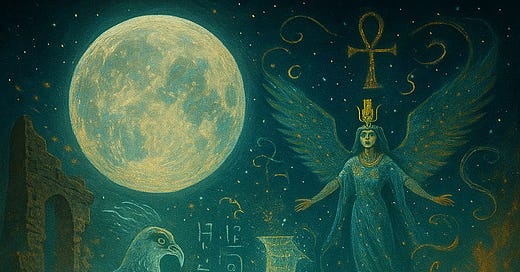THE TALE OF KHENTI AND THE WEIGHING OF THE FORGOTTEN HOURS
In the age when the stars still whispered to those who listened, and the Nile’s sacred waters carried the prayers of the living to the Duat, there came a night unlike any before. It was the time of the Full Moon of Geb, the Earth Father, known to later generations as the Moon of Capricorn. It was said in the temples that on this night, the unseen balance between Ma’at and Isfet — order and chaos — would be tested in the hearts of all who walked the Two Lands.
Khenti, a humble stone-cutter, weary from the labours of decades, had long dreamt of building a shrine in honour of Seshat, goddess of wisdom, writing, and measurement. Yet the governors and priests, whose hearts had grown as heavy as obsidian with fear and the hunger for control, forbade any such sanctuaries to gods that did not serve their power.
When the Full Moon rose, its light was like a silver eye set upon the brow of the heavens, and the people of the Black Land gathered in the great square of Waset. It was then that Thoth, the great recorder, and Sekhmet, Lady of Flame and Divine Wrath, appeared in a vision to Khenti.
« O mortal,” spoke Thoth, his voice like the turning of countless papyrus scrolls, « the time of reckoning comes. Old walls shall fall, and those who built towers of fear shall see them crumble. The scales of Ma’at weigh not merely hearts, but the very hours of forgotten deeds. »
Sekhmet, her eyes twin suns, declared,
« You are to stand before the assembly and speak the truths buried by cowardice and greed. Fear not the blades of men, for Mars — called Sah Sekhem — burns beside the moon this night, lending courage to those who bear the weight of destiny. »
That night, the square filled with murmurs as Khenti climbed the steps of the governor’s dais, his voice clear as he spoke of corrupted temples, sickened harvests, and the need to honour the gods of wisdom and balance. Some called for his death, others wept as if ancient truth had been remembered.
Above, the Full Moon and Mars aligned, and the people beheld a great sign — the collapsed visage of a serpent-faced idol, a symbol of the hidden tyranny that had drained the land. The earth trembled as the ancient structures of false power cracked, and Sekhmet’s flame passed over the crowd, burning away illusions.
Isis, mother of magic, descended in a cloak of starlight and whispered,
« Each soul is weighed not by the crowns it wears, but by the truths it dares to speak. »
In the aftermath, Khenti was not made a king, nor did he seek power. He became a voice of Ma’at, a keeper of sacred measures, teaching that true leadership is to serve the will of the Divine and the good of the people, not the hungers of mortal fear.
It is said that on each Full Moon of Geb, the veil between the old and the new grows thin, and the deeds of the past weigh heavily on the present. The wise offer prayers to Ma’at, seek clarity from Thoth, and burn cedar and myrrh to cleanse the heart.
For in the cycles of Ra’s sun-boat and Khonsu’s moon-path, the same truth endures :
« The soul that chooses discipline, integrity, and purpose rises beyond kingship, to become eternal in the Field of Reeds. »



